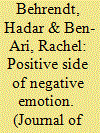| Srl | Item |
| 1 |
ID:
115732


|
|
|
|
|
| Publication |
2012.
|
| Summary/Abstract |
Two studies examined the effects of guilt and shame on coping with situations of interpersonal conflict. The first study used quantitative self-report measures to evaluate the relationship between guilt-proneness and shame-proneness and conflict coping style. The second study content-analyzed participants' narrative reports of interpersonal conflicts to evaluate the distinguishing characteristics of guilt versus shame, and the causal relationship between state guilt and shame and styles of coping with conflict. Findings highlight the characteristics of guilt and shame that may explain their differential influence on coping. Theoretical contributions and applications for conflict resolution and mediation are discussed.
|
|
|
|
|
|
|
|
|
|
|
|
|
|
|
|
| 2 |
ID:
115731


|
|
|
|
|
| Publication |
2012.
|
| Summary/Abstract |
This study examined the contribution of verbal behavior to the creation of rapport in negotiation, while methodologically addressing the issue of dependence between dyadic measures, which is inherent to the concept of rapport, with the Actor-Partner Interdependence model. The approach adopted is substantially different from that of past research, which emphasized the contribution of nonverbal behavior to rapport and used averaged rapport to asses it. Drawing both from the theoretical concept of rapport and from Politeness theory, the authors developed the Verbal Rapport Assessment scale. The authors found that rapport is indeed encoded in the verbal behavior and that various verbal behaviors contribute to negotiators' sense of rapport, as well as to the judgment of negotiators' rapport behaviors. Likewise, the authors found that a negotiator's sense of rapport was primarily affected by his partners' verbal behavior and by the interaction between behaviors of both sides. These findings emphasize the importance of the verbal channel and the dyad in creating rapport in negotiation. Negotiation in the twenty-first century is often characterized by exclusively verbal interactions (via telephone, chat, and e-mails); negotiators from many different fields can benefit from these findings.
|
|
|
|
|
|
|
|
|
|
|
|
|
|
|
|